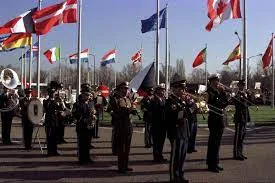With the rising drums of war, how will "NATO" respond to any attack targeting Europe?
Last weekend witnessed an unprecedented escalation of tensions between Russia and the West, due to the migrant crisis on the Belarusian-European border, as well as NATO warnings of a possible Russian invasion of Ukraine. This prompted the question: How will the alliance respond to any attack targeting its members?
The migrant crisis on the Belarusian-European border continues to fuel tension between Russia and the West, to the point of exchanging military provocations, foreshadowing the imminent danger of an armed conflict in the region. An alarm came from high levels in the political hierarchy of those countries, as in the case of the British Army Chief of Staff, Nicholas Carter, who said on Sunday that "there are risks, greater than at any time since the Cold War, of war between the West and Russia."
Before that, the US State Department had warned its European allies of a possible Russian military intervention in Ukraine. At a time when the Black Sea region is also experiencing tension following the naval exercises conducted by NATO in its waters, which Russia considered a hostile act aimed at containing it.
Military moves
The British Army Chief of Staff told The Times Radio in an interview that the risk of escalating tension had become greater in the new era of a "multipolar world", where governments compete for different goals and interests.
He explained that "authoritarian rulers are ready to use whatever means they have, such as immigrants, increased gas prices, proxy forces, or cyber intrusions, to achieve their ends," adding that "the nature of war has changed" in the absence of "traditional diplomatic mechanisms" without which "there is a greater danger." That this or that escalation leads to miscalculations." "So I think that's the real challenge we have to face," he said.
Various media sources reported that Britain sent a "small team" of its forces on Saturday to Poland to help contain the migrant crisis. The British newspaper "Daily Mail" also published that her country is preparing a special force of 600 soldiers to send to Ukraine with the escalation of the risk of Russian invasion.
Simultaneously, the Lithuanian Defense Council agreed, during a meeting, on the conditions for calling in forces from NATO to intervene at the borders of his country, which is also known for the influx of migrants. The Polish prime minister called on the alliance to take "concrete steps" to solve the migrant crisis at the border with Belarus.
Prime Minister Mateusz Morawiecki added: "It is not enough just to express concern, now we need concrete steps and the commitment of the entire Alliance." This is at a time when the Polish border forces announced that they had recorded provocations by the Belarusian army, as "the Belarusian forces used their mechanisms to remove temporary border barricades and open the crossings."
On the Russian side, its air force on Friday conducted a parachute exercise near the European borders, which Moscow said was aimed at measuring the combat readiness of its forces. A training exercise that ended with the killing of two Russian paratroopers after the ropes of their parachutes got tangled and fell to the ground.
While these exercises are added to the Russian move last week, where Moscow sent two strategic bombers with nuclear capabilities to carry out a patrol in Belarusian airspace. In a move that was said to show its military support for Belarus, and through which it sends a message to the European Union countries meeting to consider new sanctions against Minsk.
What is NATO's response?
Faced with this tense reality, NATO Secretary General Jens Stoltenberg responded on Monday, saying that "the alliance is watching with concern the escalating tensions on the borders of the European Union and Belarus, as well as on the borders of Ukraine."
"We condemn the Lukashenko regime's instrumentalization of vulnerable migrants," Stolenberg added. "We are of course deeply concerned about the situation and we are following it closely, while following developments in and around Ukraine. These are events taking place at the same time. We are also seeing tensions in fact rising in parts of the Western Balkans.Therefore, there are many things that are happening at the same time and NATO has to be vigilant, and it must follow them closely."
But apart from monitoring, and in the event that an ally or a member of NATO is targeted, there are many practical measures that the alliance can take under its founding agreement, explained by a report of the Defense One website, which specializes in military affairs. Proceeding from Article 5 of the founding paper of the alliance, which says that “an attack on one member of the alliance is an attack on all the members of the alliance,” the site affirms that any military action against any of the European countries will force the alliance forces to directly intervene in the conflict.
However, the site adds that in this case, an agreement must be reached between the members of the alliance if the shooting satisfies to be an attack according to the conditions imposed by the same article, i.e. it must be "sufficient to prevent the target country from defending itself." The site concludes that the "hybrid attack" against Europe from Belarus did not live up to the level specified by the article.






Good
ReplyDelete